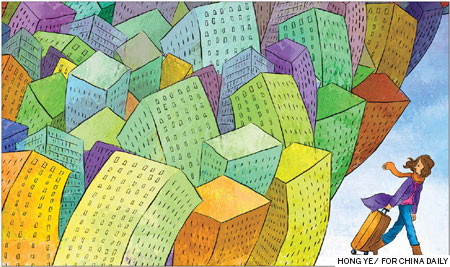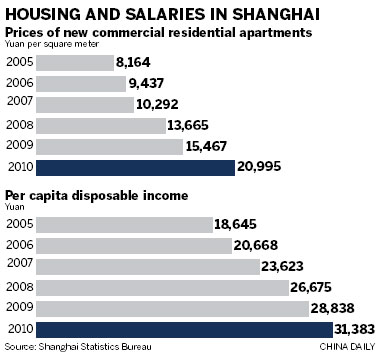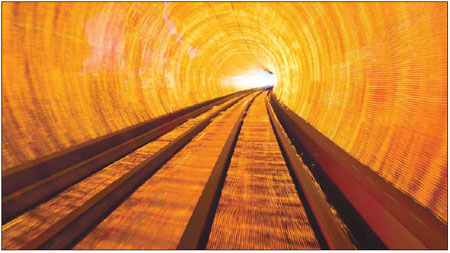Making a beeline for the suburbs
|
Shanghai's metro facility. The operation of more metro lines has helped young people, who are unable to afford the high local housing prices, to move to distant suburbs. Zhang Xiangyang / for China Daily |



Supermarkets see potential as low and middle earners flee city centers
SHANGHAI - Escalating city property prices have ignited a great race to the suburbs by the urban middle class, mostly young managers and professionals.
The rush is particularly intense in Shanghai, where prices of apartments in the city have risen by 60 percent on average during the past three years.
The population of the inner city continues to rise as floods of immigrants from rural counties in neighboring regions move in, but better-off young couples are escaping in their droves to seek a better quality of life for themselves and, more importantly, their children.
As a result, many suburbs that were once nothing more than industrial wasteland have enjoyed an unprecedented boom in the construction of sprawling residential complexes, sparkling shopping malls and a host of public-service facilities.
Ma Xinsheng, chairman of the city's retail giant Shanghai Bailian Group Co Ltd, said that the suburbs will be the company's main focus by the end of this year.
"We cannot tell you exactly which suburban areas in Shanghai we are planning to explore by the end of the year because it is a trade secret. But we can tell you that Bailian Group as a whole is about to open more than 800 supermarkets in the suburbs of a number of large cities in China, having discovered the growing purchasing power among residents in these areas," said Ma.
By 2000, Shanghai Lianhua Supermarkets, a subsidiary of Shanghai Bailian, beat Shanghai No 1 Department Store in terms of sales to become the largest retailer in China. By the end of 2010, Lianhua operated 5,172 supermarkets scattered around 19 provinces and municipalities nationwide.
The French hypermarket chain Carrefour SA, for example, has set up about 21 stores across Shanghai, including five of the nine remote districts outside the downtown area.
The exodus to the suburbs is having a profound and long-term effect on the strategic planning of corporations in many different sectors, including banking, retail, entertainment and, of course, property development. What's more, the trend is posing a new challenge to government planners, who must assign resources to meet the needs for transportation, utilities and other public services created by the ballooning populations of the suburbs.
Recognizing the needs of many newly married couples who share the China dream but lack the money to realize it in the city, some local developers began several years ago to test the market by building a few low-rise apartment blocks close to Shanghai city center, including the Baoshan and Pudong districts. Brisk sales of these modest apartments led to much more ambitious plans that expanded into a construction boom.
This led to the implementation of many public-works projects, mainly transportation. Metro lines 7, 8 and 10 were opened in recent years to facilitate travel to and from downtown destinations.
Research by China Real Estate Information Corporation (CRIC), a leading provider of housing news in China, reveals the residential communities located in the great suburban areas of Shanghai such as Fengxian district in the south and Baoshan district in the north, priced at around 15,000 yuan ($2,319) a square meter, were the most popular in the first half of this year.
"Especially starting from the beginning of May, about 120,000 square meters of commercial residential apartments, priced less than 20,000 yuan a square meter, were sold every week. It means that people with a real need to buy an apartment for their own residential use - most of whom were looking at low- or mid-level properties - are dominating the market," said Xue Jianxiong, a senior analyst with CRIC.
Statistics recently provided by SouFun Holdings Ltd, the country's biggest real estate website, show that among the 100-plus residential communities that will go on sale over the next six months, more than half are in the suburbs of the city and priced from 15,000 to 30,000 yuan a square meter. These apartments are aimed at people with a real need to buy their own apartment - for example, recently married couples.
Gu Yinghao is a senior air traffic controller with the Air Traffic Management Bureau of East China. Married in March, Gu spent about three years preparing for his big day. He was especially careful about the most important element - the couple's new home.
Although his job is highly regarded and demanding, his salary is "no match with his counterparts in the West".
He said: "I joined the bureau in 2008. I made an annual salary of 100,000 yuan in the first year, 140,000 yuan in the second year and 150,000 yuan in the third year."
That, he said, meant he could only afford to buy in the more remote suburbs of Shanghai. New apartments within the Shanghai Inner Ring Road, the central part of the city, are "way too expensive".
After searching for about a year, he finally settled on a residential community in Nanhui district in the southeastern corner of Shanghai.
"It is really far away, about 18 kilometers away from the Shanghai Outer Ring Road, the nearest expressway I can take. It will take me at least 40 minutes to drive from the apartment in Nanhui to my office near Hongqiao International Airport - not allowing for traffic jams," said Gu.
"I only paid 10,000 yuan for the Ford I am driving now. My parents covered the remaining 170,000 yuan. It is good that I have got a car now, otherwise I would have to spend more than five hours a day traveling from home to the office by bus and metro."
Gu bought the 92-square-meter apartment in the estate developed by Shanghai Gangtai Property Company in 2009 in preparation for his marriage.
"The apartment cost 8,000 yuan a square meter at that time. I only paid a 20 percent downpayment when I signed the contract. Therefore I need to repay about 3,000 yuan every month," said Gu.
To make ends meet, Gu started counting every single bit of income and expenditure after he bought the apartment, "exactly every number".
Although Gu has an apartment of his own, he and his wife are still staying with his parents in Pudong new district, which is much closer to his office.
"The time we would have to spend traveling to and from work is too much of a headache for us. What's more, there are few facilities around the apartment we bought. We have no place for recreation. Therefore, I am considering this apartment as an investment. If I could, I would definitely sell it and move to an apartment near my office," said Gu.
Most commuters from the suburbs resent the amount of time they spend commuting. Mao Mao got married in April this year. Currently a third-year PhD student studying civil engineering in Shanghai Tongji University, she spends almost 90 minutes traveling from her home in the north of Shanghai to her university, via lines 7, 4 and 10 on the subway.
"I have to get to the lab around 10 am about four times a week. My work is quite flexible now," she said.
But it is quite a different story for Mao's husband Xiao Pang, who graduated from Tongji University and now works as a structural engineer with the Shanghai office of Arup Associates, a London-based company providing engineering, design, planning, project management and consulting services for the built environment. His office is in mid-Huaihai Road in the city center and he has to travel for more than an hour every day from home to work.
The couple bought a 92-square-meter apartment in North Shanghai's Baoshan district in June 2009 before their wedding at a cost of 9,000 yuan a square meter. As a present for their marriage, Mao's parents gave the couple 200,000 yuan to pay the 20 percent down payment.
As Mao is still pursuing further studies, the burden of paying back the loan at 2,200 yuan a month is left to Xiao.
"My husband made some 100,000 in his first year with Arup. I know it is not a lot of money. However, as the firm is world famous and receives good project orders worldwide, he still considers it a good opportunity to work there. As he has been working with Arup for about four years, his salary has increased annually," said Mao.
Living in the same residential community as Mao, Liu Yinzhi and her husband Qiu Dapeng are better placed, having both been working for at least five years.
Liu went to study civil engineering as a postgraduate at Cardiff University in Wales in 2004. Her husband went to pursue the same degree at the University of Southampton in England in the same year. Liu started her job in Shanghai in 2005. She is now a business manager working for the UK-based management and construction consultants Gleeds Building Surveying Ltd, while Qiu is now a project manager with the US-based CB Richard Ellis Group Inc, a company providing all kinds of real estate services. Both have management positions in their respective companies. They are now making an annual salary of about 500,000 yuan.
The apartment that Qiu bought is exactly the same as Mao's. After making a 20 percent downpayment, their repayment is 3,000 yuan every month - a sum they regard as "little burden".
Although Liu's parents gave her a car, an Audi A4, as a wedding present, she seldom drives to work because she considers public transport to be very convenient.
"There is a metro line running around the community. It is only a 30-minute ride from our home to our offices in the downtown part of the city. We would quite likely encounter traffic jams during the rush hour if we drove. Therefore, we prefer taking the metro to work," said Liu.
Liu's family bought her a 100-square-meter apartment outright in 2006 at a cost of 10,000 yuan a square meter. Located near Shanghai Railway Station and the city center, the apartment is now worth at least 30,000 yuan a square meter.
But Liu still prefers her apartment in Baoshan, where almost all necessary living facilities can be found around the residential community.
"We are thinking of having a baby next year. It is good that a kindergarten, a primary school and a middle school have been established in our community. It seems that everything is ready now," laughed Liu.
The residential community is not short of shopping areas. A large department store is said to be coming in six months, according to Liu. Two Lianhua supermarkets already exist within the community.
While retail giants reach out to the suburban areas, some residential communities in suburban Shanghai areas have reported price reductions from the beginning of June.
According to Shi Hongrui, general manager of Hanyu Property, a Shanghai-based property-consulting firm, prices for some commercial residential apartments located in suburban Shanghai such as Baoshan or Pudong have dropped by about 4,000 yuan a square meter.
"Because more than 70 percent of apartments in these residential communities have been sold, it is very likely that the price will drop by 10 percent in the coming months," said Shi.
China Daily
(China Daily 07/04/2011 page13)















